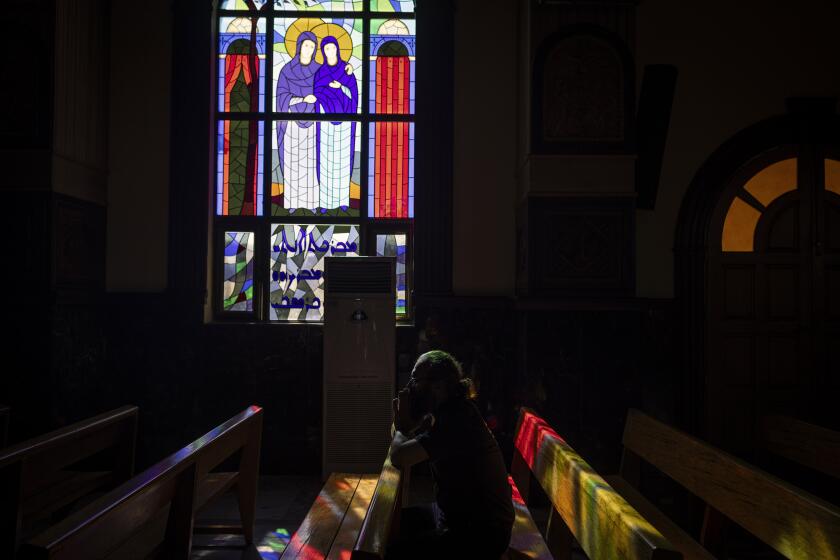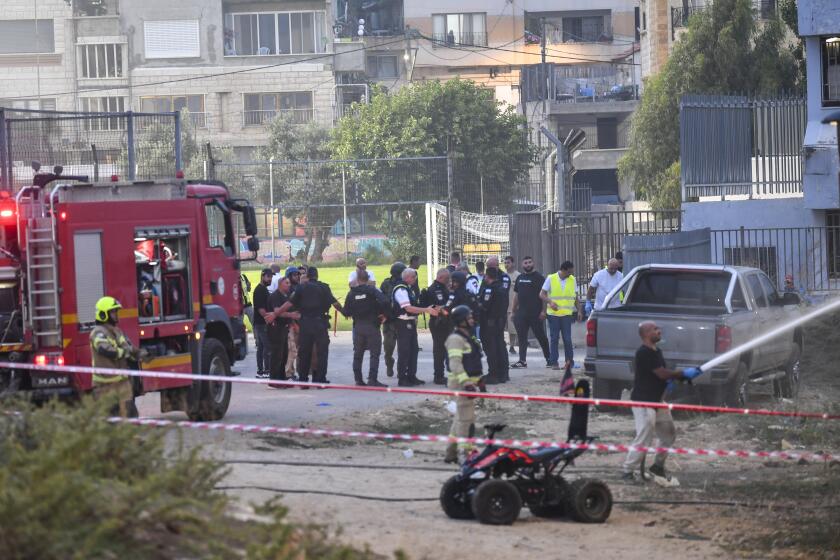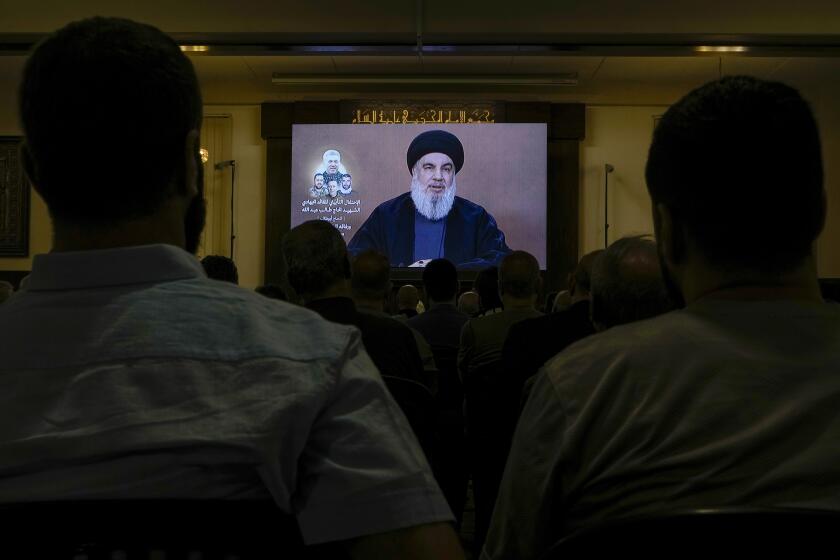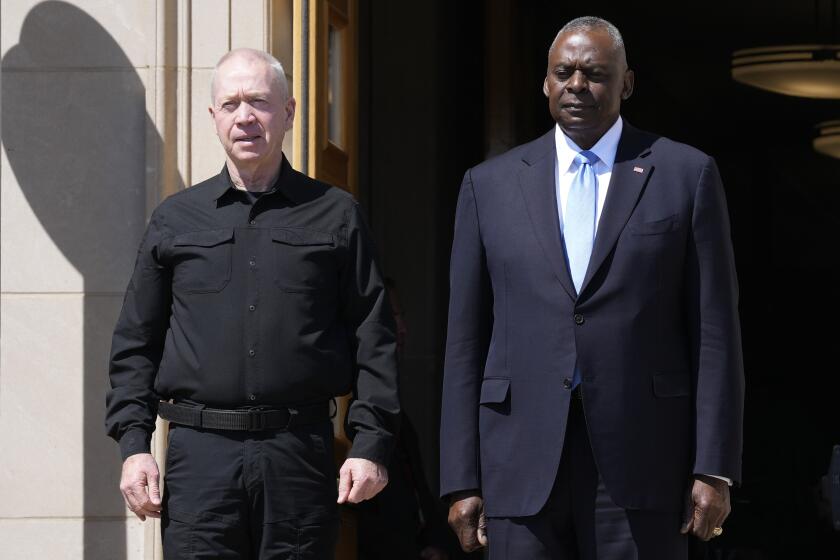Netanyahu vows retaliation against Hezbollah after weekend strike as U.S. warns against escalation
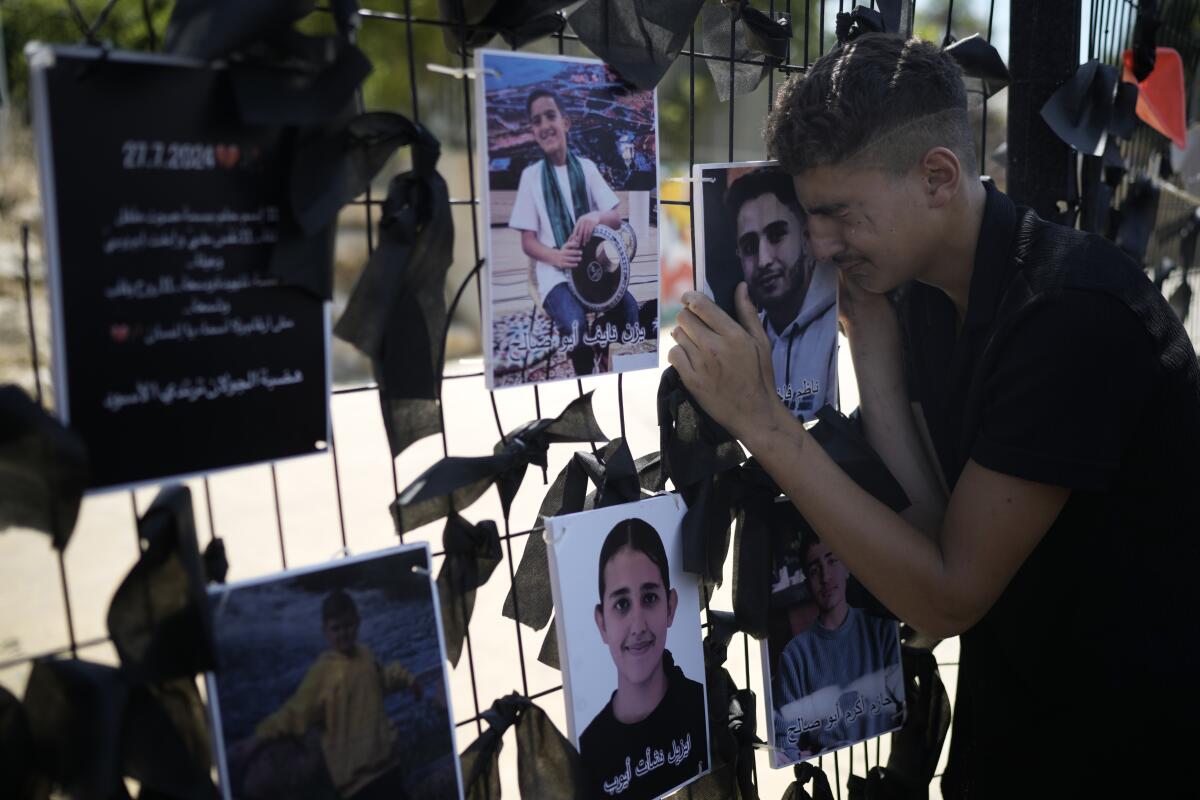
- Share via
MAJDAL SHAMS, Golan Heights — Israeli Prime Minister Benjamin Netanyahu on Monday vowed heavy retaliation against Hezbollah amid furious diplomatic efforts to prevent a spiral into regional war following a weekend rocket strike that killed 12 children in the Israeli-controlled Golan Heights.
Israel has blamed Hezbollah for Saturday evening’s rocket from Lebanon that slammed into a soccer field where the children were playing in the mainly Druze town of Majdal Shams. In an unusual move, Hezbollah denied any role in the strike.
U.S. Secretary of State Antony J. Blinken spoke with Israeli President Isaac Herzog on Monday, emphasizing the “importance of preventing escalation” and discussing efforts to reach a diplomatic solution to months of conflict.
Israel has assassinated two dozen Hezbollah commanders in Lebanon since last fall amid an intelligence war employing cellphones, drones and fake rocks.
Israel and the Iranian-backed Lebanese Hezbollah have exchanged fire almost daily over the border since the war in Gaza erupted in October. Each side has seemed intent on avoiding an escalation that would bring their full firepower against each other. But the exchanges have mounted, and the latest strike threatened reprisals and counter-reprisals that could spiral into full-fledged war.
Early Monday, Israeli strikes hit a motorcycle in Lebanon near the border, killing two people and wounding three others, Lebanese state media said. The strikes, mirroring the pace of the daily cross-border fire, did not appear to be in retaliation for Saturday’s attack.
Thousands attended the funeral Monday of 11-year-old Guevara Ibrahim, whose body was carried through the streets of Majdal Shams in a procession of black-clad mourners.
Netanyahu visited the soccer field in Majdal Shams and met with leaders of the Druze community.
Christian areas scattered across Hezbollah-dominated southern Lebanon find themselves on the front line of a fight that few see as theirs.
“These children are our children, they are the children of all of us,” he said as officials laid a wreath on the field. “The state of Israel will not and cannot overlook this. Our response will come, and it will be severe,” he said, adding that the rocket was fired by Hezbollah.
Nearby, around 300 friends, supporters and relatives of the slain children protested against Netanyahu’s visit, shouting that he was exploiting the bloodshed for political gain and calling for an end to the violence. Some held up pictures of the dead children, saying they wanted no more killing.
After Netanyahu left, some rushed onto the soccer field and tore down the wreath. Weeping relatives held up toys left by the children on the field.
The Druze of the Golan Heights have long had a fraught relationship with Israel since it captured the territory from Syria in the 1967 war and later annexed it. Some Druze have Israeli citizenship, and ties with Israeli society have grown over the years. But many still have sympathies for Syria and have rejected Israeli annexation.
Israel says at least 11 people have been killed by a rocket strike in the Israeli-controlled Golan Heights. It blames Lebanon’s Hezbollah, which issues denial.
Earlier in the day, Israeli Defense Minister Yoav Gallant also visited the town, saying Hezbollah will “pay a price” for the attack. He did not elaborate, saying only, “We will let actions speak for themselves.”
Israel’s military says Hezbollah fired an Iranian-made Falaq rocket with a 117-pound warhead.
Hezbollah has started moving precision-guided missiles for use if needed, an official with a Lebanese group told the Associated Press, without elaborating on where they are being moved.
The official said Hezbollah’s stance has not changed and it does not want a full-blown war with Israel, but if war breaks out it will fight without limits. The official spoke on condition of anonymity to discuss sensitive military activities.
Hassan Nasrallah’s comments came as the cross-border conflict simmering between Hezbollah and Israel appears to be reaching a boiling point.
Israel and Hezbollah have been trading fire since Oct. 8, a day after Hamas militants stormed into southern Israel. Hezbollah has said it is showing its support for the Palestinian group.
More than 500 people, including 90 civilians, have been killed in Lebanon, as have 22 soldiers and 25 civilians on the Israeli side. Tens of thousands have evacuated their homes on both sides of the border.
The U.S. and France for months have pushed a negotiated agreement between Hezbollah and Israel to quieten the border and allow the return of residents.
The White House National Security Council said it was speaking with Israeli and Lebanese counterparts and working on a diplomatic solution to “end all attacks once and for all” in the border area.
U.S., European and Arab mediators press to keep attacks between Israel and Lebanon’s Hezbollah militants from causing an ‘apocalyptic’ Middle East war.
Amos Hochstein, a senior advisor to President Biden who frequently handles delicate negotiations in Lebanon, has been making a flurry of calls trying to contain the situation, a Lebanese diplomat said, speaking on condition of anonymity because they were not authorize to talk to the press on the issue.
An outright war between Israel and Hezbollah could bring intense destruction. Hezbollah has far superior firepower than Hamas, with an arsenal of 150,000 rockets and missiles, including precision-guided missiles, according to Israeli estimates.
The last time they went to war, in 2006, Israel inflicted massive damage in Lebanon with a bombing campaign in retaliation for a cross-border Hezbollah attack. The death and destruction were so great that Hezbollah has been under intense pressure from the Lebanese ever since not to trigger a repeated war with Israel.
Lebanon’s caretaker Prime Minister Najib Mikati spoke to British Foreign Secretary David Lammy. “We both agreed that widening of conflict in the region is in nobody’s interest,” Lammy said in a post on the social media site X.
Correa and Bernstein write for the Associated Press.
More to Read
Sign up for Essential California
The most important California stories and recommendations in your inbox every morning.
You may occasionally receive promotional content from the Los Angeles Times.

